Recently, we did an article on CPU Liquid Coolers, which focused on the best CPU cooler available in the marketplace. In that article, we outlined the benefits and drawbacks of liquid cooling and provided you with some options across a plethora of CPU sockets, radiator sizes, aesthetics, and prices.
However, our list did not include—for obvious reasons—CPU air coolers. In this article, we’ll cover the other side of the CPU cooling market. Our review of the best CPU coolers available will take your PC computer to DEFCON 1 next level performance by helping to keep your CPU cooler.
Best Choice
CM Hyper 212 EVO
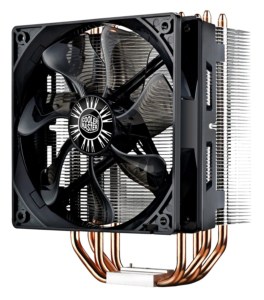
Legendary CPU Cooler
Leagues ahead of any stock cooler that may come with your CPU.
Overall, this is an incredible cooler at an incredible price.
Premium
Arctic Freezer 33 eSports
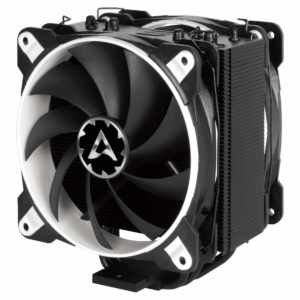
Sleek, Clean Design
Looks good and will undoubtedly tie into any build you do.
Threadripper edition could cool a massive CPU.
Best Value
Noctua NH-D15
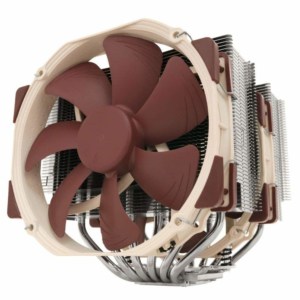
Super Practical
Outperforms many liquid coolers at similar price ranges
Two excellent, practically silent fans.
Just like the gamer the computer also has to stay cool and sweat free to do the job it was designed for. Air cooling has been the standard since the inception of computers, and for a very good reason: they are cheap and reliable. Copper is great at dissipating heat, so placing it against a hot electronic device—like a CPU—is practically an easy decision.
The copper pipe will pull the heat away from the CPU to the fan where it will dissipate. Because of price, the market is full of candidates for the best CPU air coolers that range in size from tiny small-form-factor coolers, to massive air coolers that require specific cases to mount them.
The rule of thumb for choosing the best CPU air cooler are: the larger the cooler, plus the more heat pipes and fins, the better the cooling. The best CPU heatsinks can get really big. There is a point of diminishing returns, where the laws of thermodynamics can only do so much to remove the heat in a timely and efficient manner.
Your average affordable desktop computer that can safely be used for gaming and graphics work comes with a standard basic cooler that will do the job but not give that little extra extreme users demand. It also probably won't have the best CPU heatsink.
If your traversing high definitions VR environments then investing in a top of the range aftermarket cooler will lower your CPU temperatures, it will reduce noise and potentially make your CPU run faster. The benefits of a the best CPU coolers will go way beyond the obvious. It will open up more headroom for overclocking your CPU if you dare take it to the max.
The good news is, you won’t have to shell out a fortune to reap the benefits–just $20 will get you one of the best CPU coolers. There are more expensive air coolers out there. So, before we have a look at the most popular CPU air coolers and see which is worth stretching your budget, here are some issues to consider when choosing the best CPU air cooler.
Why do CPU’s heat up?
It’s normal for a CPU to heat up and get warm when playing high definition games, actually they are designed to run at high temperatures. In fact, temperatures of over 200 degrees Fahrenheit are frequently acceptable. The CPU in your computer works by either enabling electric signals to pass through its microscopic transistors or by blocking them.
The easiest way to understand a processor is to think of a light switch. You can either turn the light switch off or on. You are creating a circuit or breaking it, that’s all, nothing more. Anything that uses electricity has to conform to this model because that’s all electricity does. It is not intelligent, it cannot reason or make decisions.
Any device that uses electricity is also not intelligent and cannot reason. Electricity is binary. It is, or it is not. It is a 1 or a 0. It goes or it stops. So, as electricity passes through the CPU it gets blocked or it continues on its journey but as it goes on its merry way, it gets turned into heat energy. A CPU’s temperature is directly proportional to the amount of electricity that passes through it. While a processor in a high-performance workstation may run hot because of heavy use, if a processor in a regular computer overheats that is almost always a sign of a malfunctioning cooling system.
Heavy Loads
Mostly in a computer doing typical word processing, email and spreadsheet tasks, the CPU will be idle and often run cool. If you, however, you use the computer to generate 3-D renderings and walk-throughs from architectural plans drawn in computer-aided design software or to run complicated financial models, those tasks are computationally intensive and will cause the CPU to be more active hence heat up. Even under heavy loads from the best games, a properly functioning cooling system shouldn’t overheat unless you overclock your CPU, as that will definitely demand more processing power, therefore more electricity and consequently more heat.
Airflow Issues
To move the heat away from your CPU to the outside of your computer’s case, multiple cooling components have to work together. Regardless of how Gucci your computer’s cooling system is, if air doesn’t flow freely, it won’t work. Before you get out the credit card to purchase the latest cooling system, check the inlets and exhaust ports. Get some compressed air to blow out the case this should remove the dust that has clogged the airflow passages.
CPU Cooler Failure
Your CPU has three components; a fan, a heatsink and a thin layer of thermal conductant that helps to transfer the heat from the CPU to the heatsink and fan. If the case isn’t dusty but your CPU is heating up, look to see if the cooling fan is spinning, if it has stopped, replace it. Another option is to replace or reattach the thermal tape or grease so that you have a fresh coating. And remember to get the best CPU heatsink you can to go with your best CPU cooler!
System Cooling Failure
Your computer should also have at least two fans, a power supply fan and a case fan. If they stop working, then the hot air the CPU is removing is staying in the computer case where it bakes the CPU and the other components. Replacing any defective case fans should solve the problem.
How loud should an air cooler be?
One of the main reasons given by gamers to invest in the best CPU coolers is to reduce the noise coming from your rig whilst gaming. There are completely neutral air coolers like the Zalman FX70 that will make your PC almost silent. But what should you be aiming for?
If your mini tower is located on top of your desk, right by your head, then your benchmark should be something close to 30dB, or below, if possible. That’s about as quiet as a cemetery in the middle of Nowheresville on a still cloudy night.
If your PC is under your desk, then you can afford to be more lenient–up to 35dB will still be just about inaudible in a typical home. If you’re working in a slightly noisy office, you won’t hear your PC unless it’s over 40dB.
How efficient are aftermarket CPU coolers?
CPUs come with built-in temperature sensors safeguard the CPU from overheating. When the CPU gets too hot, the sensor will trigger a reduction in processing speed until temperatures drop. This happens when the CPU goes above 90°C, although it varies according to the brand. You’ll want to ensure your PC is some way below that to be on the safe side.
When gaming your CPU can get to 100% capacity, any air cooler that can keep its temperature below 70°C is doing a good job, 60°C or below is outstanding. Even when gaming, most CPUs are nowhere near 100% usage. At optimum usage, a good air cooler should remain almost completely silent while keeping your CPU only a few degrees above ambient temperature.
Heatpipes
Air coolers use copper Heatpipes that contain a liquid which vaporizes when heated. This vapour then travels along the inside of the pipe to the cooler end where it condenses, releasing the latent heat. Used in most of the best air CPU coolers, heatpipes are very effective at drawing initial heat away from the area of the CPU and transferring it to the cooling fins. Cheaper air coolers will have two or three pipes, while the largest have six or more. Liquid coolers don’t need them as the liquid inside serves the same purpose.
Massive best air CPU coolers can outpace their liquid rivals. However, liquid systems usually have the edge in temperature comparisons.
The lack of a pump allows larger air coolers to be priced lower than liquid coolers, which is great for your budget but both cooling systems have their flaws. For example, air coolers are normally located directly over the CPU, which can block access to some of your memory slots and some cable connectors. Liquid coolers move the radiator to one of the case’s outer panels, leaving the CPU socket covered by a combination of water block and pump. But closed looped coolers can leak over time and dry out. Air coolers don’t have pumps, therefore less noise and degradation.
On the whole, liquid coolers have the edge over even the best air CPU coolers. However, builders of PC rigs use CPU air coolers when a system is intended to remain stationary, and switch to liquid when the system is designed to be moved around.
Installation
One of the great advantages of having the best air CPU cooler system is they are simple to install. With large coolers, you may need to fit a backplate to the motherboard This requires removing the motherboard if your PC doesn’t have a cutout tray designed for this purpose. Fitting some coolers can be tricky as they tend to be very fiddly with complicated mounting systems that make them a challenge to install.
Below, we’ll explore the best CPU air coolers in the market, and cover why we recommend them!
1
Cooler Master Hyper 212 EVO Review

To call the Hyper 212 EVO a “legendary” best CPU air cooler would be an understatement. It has been around since practically the dawn of time itself. Okay, maybe not that far back, but its name is well-known in the build world, and for good reason.
This best CPU cooler is superb and cheap. The best CPU coolers can typically be had for less than $30 USD, and it even comes with a fan that, while not the most modern, will more than do the job. Included in the package is everything you’ll need to get it set up and running. That means one of the best CPU heatsinks, an included fan, all the necessary mounting hardware, as well as complementary thermal paste. Plus, extra brackets for mounting an additional fan, if you desire a push-pull configuration.
This best air CPU cooler will be leagues ahead of any stock cooler that may come with your CPU, partially thanks to the best CPU heatsink. It will even allow for some overclocking, depending on what CPU you pair it with. The only real drawback to this CPU is its lack of out-of-the-box support for AMD’s AM4 socket, which covers their Ryzen lineup of CPUs.
Some Ryzen motherboards will use the traditional AM3 mounting bracket, which the Hyper 212 supports, while others will not. Finding a Hyper 212 variant with AM4 support will depend on when the cooler was shipped, as Cooler Master shipped it with the required mounting hardware much later. The versatile mounting arm means, however, that this will support most Intel sockets, and anything from Intel or AMD pre-Skylake and pre-Ryzen for sure. Overall, this is an incredible cooler with one of the best CPU heatsinks at an incredible price.
2
Enermax ETS-T40 Fit
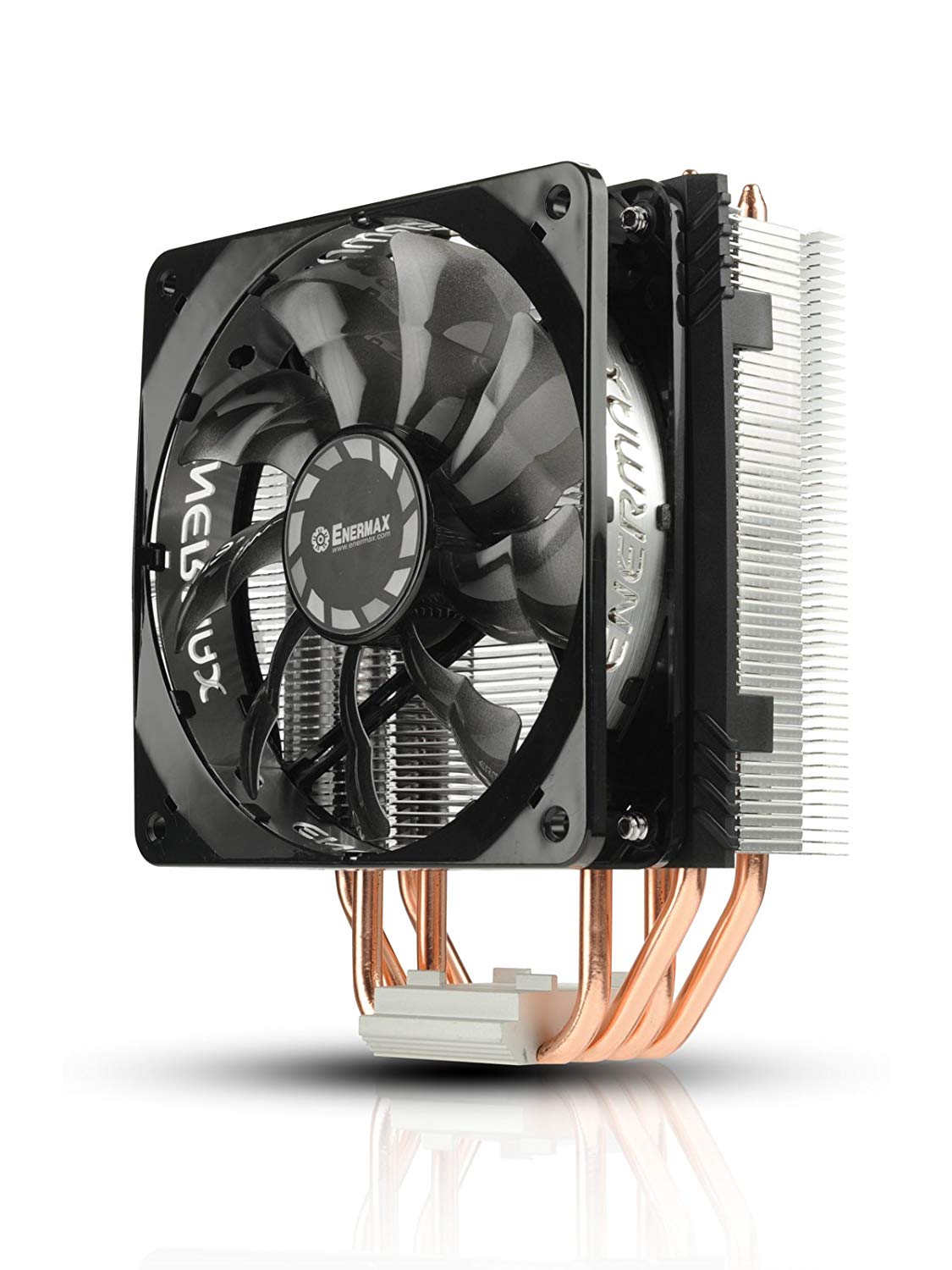
This Enermax ETS-T40 Fit is versatile, with its native AM4 support, but its cooling potential is slightly better and sometimes significantly better than the previously mentioned best CPU coolers.
It has a sleeker design for those who care about aesthetics, and it even offers an RGB variant for slightly more money, if you’re into that sort of thing.
The Enermax ETS-T40 Fit is everything you want out of a cooler and won’t let you down despite your heavy workload. While this monster cannot tackle behemoths like Threadripper, it can more than adequately cool everything up to that point.
3
Noctua NH-D15

Have you ever seen one of those monster trucks on the road? The kind that sits so high off the ground, you fear you may die if you fall out? How impractical it seems for everyday use?
That’s the Noctua NH-D15. Oh, except this is actually super practical. If your case can support this monstrosity, the NH-D15 is among the absolute best CPU air coolers on the market, outperforming many liquid coolers at similar price ranges. How does it pull off this feat, you may ask? By being as large as a small computer case, that’s how. Do you know what’s better than even the best CPU heatsink? Two best CPU heatsinks!
At least, that was Noctua’s logic when building this best air CPU cooler, as the NH-D15 is the air cooling equivalent to a W16 engine. Noctua is known for its high-quality fans with ugly color schemes. This best CPU cooler comes with two of them, and they perform excellently. They’re practically silent, and could probably cool down a nuclear reactor if you somehow managed to mount it to one.
The only downsides are its size, and lack of AM4 support out of the box. There is, however, an AM4 variant available for a few extra dollars. If you have a case that can support such a thing and low-profile RAM that you can slot beneath this behemoth then there are few coolers better than it at this price.
4
be quiet! DARK ROCK 3
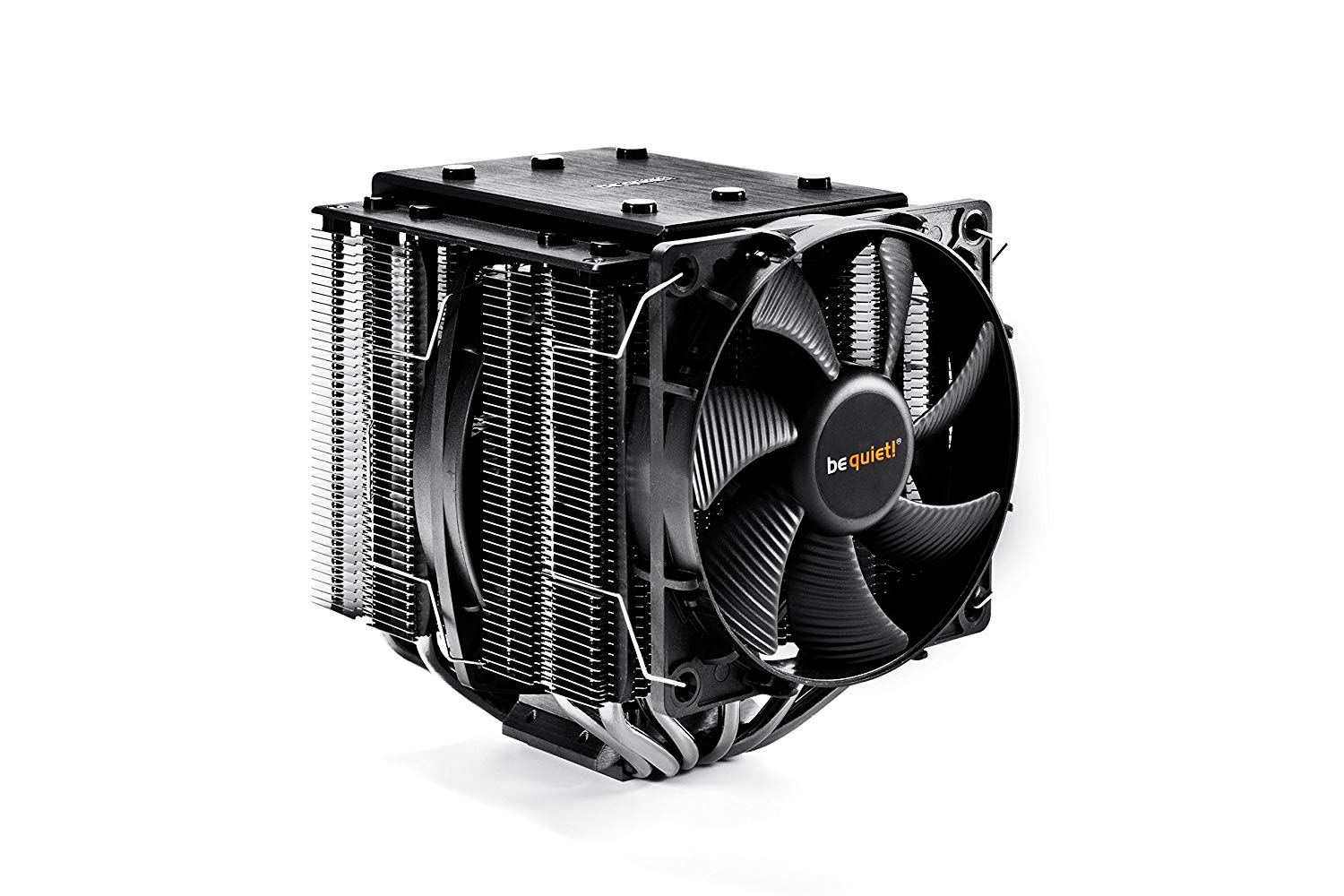
I can’t help but imagine that the CEO of be quiet! has phonophobia. All of their best CPU coolers are just so quiet, it’s kind of incredible. Truly, they live up to their name, especially when it comes to their fans.
At max RPM, their SilentWings fans are practically silent, as you hear only the sound of the air itself being moved. Well, what happens when you combine those fans with the best CPU heatsink? The DARK ROCK 3, that’s what.
This best CPU cooler stands out because of its all-black, sleek design, and its inclusion of the SIlentWings fan. This fan by itself costs almost as much as the Hyper 212 cooler, and for a very good aforementioned reason.
When you couple that fan with the best CPU heatsink and all-black design, you’re left with a sleek, desirable cooler that performs.
Who would have thought? Function AND form! This cooler even supports AM4, edging it just slightly ahead of the NH-D15 for this reason. If you need a smaller variant or need something cheaper, consider looking into the PURE ROCK cooler, this CPU cooler’s smaller cousin.
Overall, this is one of the best CPU coolers, albeit at a slightly higher price, but you definitely get what you pay for.
5
Arctic Freezer 33 eSports Edition

This cooler’s Threadripper edition could cool a massive CPU, whilst it was overclocked. Although the name sounds like some marketing gimmick there is much more to the Artic Freezer than just marketing schpeel. This best CPU cooler comes with two decent-if-not-good fans.
You have the option to buy them with white rings, red rings, yellow rings or green rings, to help tie the cooler into the rest of your build. Furthermore, this best air CPU cooler won’t hurt your pocket.
You can regularly find one of these best CPU coolers for the same price as the Hyper 212, and sometimes the H7. It also has a rather sleek, clean design you will really appreciate. Oh, and it has AM4 support, so that’s a nice bonus. This cooler will not be the best performer on this list, nor is it the best-specked feature-wise. However, it looks good and will undoubtedly tie into any build you do.
Conclusion
We hope you enjoyed our list of the best CPU air coolers at a variety of different price points. Our only exclusion was low-profile air CPU coolers, as they’re part of a niche market, and few are available anymore. In the future, we may do an article covering the many perks and facets of low-profile building, including the few cooling solutions available on the market. If you disagree with our picks or do not see one of the best CPU coolers you believe belongs in here, please let us know and we’ll look into it!
- AndaSeat Kaiser 3 Review: A Welcome Surprise! - September 13, 2023
- Secretlab Professional Footrest Review: Expensive, But Ultra Solid - March 9, 2023
- Sofa Sack Bean Bag Chair Review - September 10, 2022
